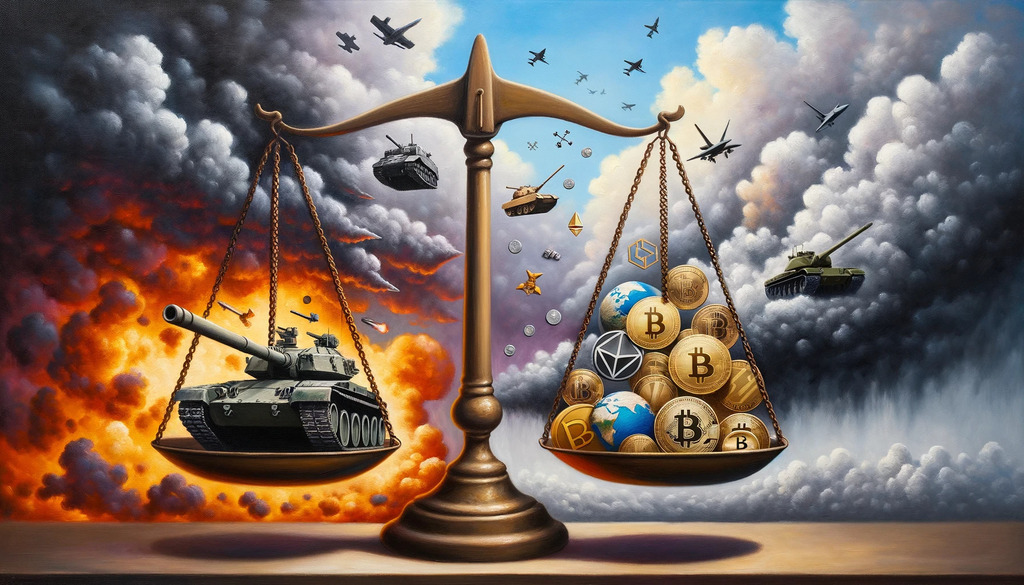The past year has seen a series of significant world conflicts, each with its own set of economic, financial, and cryptocurrency implications. This article delves into these impacts, drawing from authoritative sources such as BBC World News.

Israel-Gaza Conflict
- Economic Impact:
- Business Operations: Companies, ranging from airlines to banks, have ceased operations in Israel, leading to a significant economic downturn in the region. Many businesses have shifted to remote work models, asking their employees to work from home.
- Oil Prices: Analysts have observed limited effects on oil prices in the short term, as neither Israel nor Gaza are significant oil producers. However, the broader geopolitical implications can influence global oil markets.
- Cryptocurrency Impact:
- Fake News: Platforms have seen a surge in fake news related to the conflict, which can influence investor sentiment and lead to volatility in cryptocurrency markets.
Israel-Gaza Conflict: A Deeper Analysis
Economic Impact:
- Business Operations:
- Direct Losses: The cessation of operations by companies, especially major ones like airlines and banks, results in direct economic losses. This includes lost revenues, potential layoffs, and reduced economic activity.
- Supply Chain Disruptions: With businesses shutting down, there can be disruptions in both local and international supply chains. This can lead to shortages of goods, increased prices, and further economic strain.
- Remote Work Challenges: While shifting to remote work models can keep operations going, it comes with its own set of challenges. There can be reduced productivity, increased cybersecurity risks, and potential communication barriers.
- Oil Prices:
- Short-Term Stability: The fact that neither Israel nor Gaza are significant oil producers means that the immediate supply of oil remains stable. However, the Middle East is a pivotal region for oil, and any conflict can have ripple effects.
- Long-Term Implications: Prolonged conflicts can lead to increased oil prices due to potential threats to nearby oil-producing regions. Speculation and investor sentiment can also play a role in driving prices up.
Cryptocurrency Impact:
- Fake News:
- Market Manipulation: The surge in fake news can be used as a tool for market manipulation. Misinformation can lead to panic selling or buying, allowing certain entities to profit from these price swings.
- Trust Issues: The credibility of cryptocurrency platforms and news outlets can be questioned if they don’t take measures to curb the spread of fake news. This can deter potential investors and reduce overall trust in the crypto ecosystem.
- Regulatory Scrutiny: Governments and regulatory bodies might increase their scrutiny of cryptocurrency platforms, especially if they believe that misinformation is being spread intentionally. This can lead to stricter regulations and potential challenges for the crypto industry.
Economic Crisis in Malawi
- Economic Impact:
- Forex Shortage: Malawi has been grappling with a severe forex shortage, triggering a cost-of-living crisis in the country. This has implications for trade, imports, and overall economic stability.
- Cryptocurrency Impact:
- Alternative to Traditional Currency: In countries facing economic crises, cryptocurrencies can serve as an alternative to traditional currencies, especially when there’s a lack of trust in the national currency.
Economic Crisis in Malawi: A Comprehensive Analysis
Economic Impact:
- Business Operations:
- Tailoring Industry: Joe Kambale, a tailor from Blantyre, Malawi’s commercial hub, has witnessed a significant decline in demand for his services. The rising cost of living has driven clients away, with some prioritizing spending on basic needs. The increasing cost of imported tailoring materials has further strained his business, leading to reduced profit margins.
- Forex Shortage:
- Impact on Daily Life: Malawi has been grappling with a severe forex shortage, leading to a cost-of-living crisis. Essential goods such as food, medicine, fertilizer, and fuel have become scarce. The Reserve Bank of Malawi announced that the foreign exchange reserves were “nearly empty.”
- Global Influences:
- COVID-19 and Ukraine War: Malawi is still grappling with the effects of the pandemic and the war in Ukraine on its global supply chain. The conflict in Ukraine has led to a 50% increase in the price of bread in Malawi.
- Natural Disasters:
- Cyclone Freddy: The impact of Cyclone Freddy, which displaced nearly 90,000 people in March, has further strained the country’s economy, especially in regions like Blantyre.
- Currency Devaluation:
- Kwacha’s Decline: To stabilize dwindling forex reserves, Malawi’s central bank devalued the kwacha by 25% last May. As of October, the currency had further weakened by 4.87%. This has led to skyrocketing inflation, making essentials like food and electricity unaffordable for many.
Cryptocurrency Impact:
While the article from Al Jazeera does not directly address the cryptocurrency impact, based on the economic situation:
- Potential for Cryptocurrency Adoption:
- Alternative to Traditional Currency: Given the severe forex shortage and the devaluation of the kwacha, there’s potential for increased interest in cryptocurrencies as an alternative. Cryptocurrencies can offer a more stable store of value and a means of transaction, especially when the national currency is volatile.
- Remittances:
- Support from Abroad: As the economic situation worsens, Malawians abroad might look for efficient ways to send remittances back home. Cryptocurrencies can offer a faster and cheaper solution compared to traditional banking systems.
Conclusion:
The economic crisis in Malawi is multifaceted, influenced by both internal challenges and external global events. The situation underscores the interconnectedness of global events and their profound impact on local economies. As Malawi grapples with these challenges, there’s potential for innovative solutions, including the adoption of cryptocurrencies, to play a role in stabilizing the economy.
Bank of China Scandal
- Economic Impact:
- Bribery Charges: The former chairman of the Bank of China has been arrested on bribery charges. Such scandals can deter foreign investments and shake confidence in the country’s financial institutions.
- Cryptocurrency Impact:
- Trust in Traditional Banking: Scandals in traditional banking can lead to an increased interest in cryptocurrencies as they offer a decentralized alternative to traditional banking systems.
Bank of China Scandal: A Comprehensive Analysis
Economic Impact:
- Investor Confidence:
- Deterrence of Foreign Investments: Scandals involving major financial institutions can shake investor confidence. Foreign investors may become wary of investing in Chinese markets or businesses, fearing potential regulatory or legal repercussions.
- Stock Market Reactions: The Bank of China, being a significant entity in the Chinese financial landscape, can influence stock market movements. Any negative news or scandal can lead to a decline in its stock price, which can have ripple effects on related sectors and the broader market.
- Regulatory Implications:
- Increased Scrutiny: Such scandals can lead to increased regulatory scrutiny on the banking sector. Regulators may introduce stricter compliance measures, audits, and oversight to prevent future incidents.
- Reputation Damage: The reputation of the Bank of China, and by extension, the Chinese banking sector, can be tarnished on the global stage. This can impact partnerships, collaborations, and trade agreements with international counterparts.
- Operational Challenges:
- Internal Reforms: In the wake of such scandals, the bank may need to undertake internal reforms, which can include leadership changes, restructuring, and policy revisions. This can lead to short-term operational challenges and disruptions.
- Legal Proceedings: The bank may face legal proceedings, both domestically and internationally, depending on the nature and extent of the scandal. This can result in financial penalties, litigation costs, and further reputational damage.
Cryptocurrency Impact:
- Shift Towards Decentralization:
- Lack of Trust in Traditional Banking: Scandals in traditional banking institutions can lead to a loss of trust among the public. This can drive interest towards decentralized financial systems, including cryptocurrencies, which are perceived as being free from such institutional issues.
- Potential for Regulatory Changes: The Chinese government’s stance on cryptocurrencies has been dynamic. A major banking scandal can influence regulatory policies, either driving stricter regulations on cryptocurrencies as a preventive measure or potentially easing restrictions to diversify financial systems.
Conclusion:
The Bank of China scandal underscores the intricate relationship between traditional financial institutions and the broader economic landscape. Such incidents highlight the vulnerabilities of centralized systems and can act as catalysts for change, both in regulatory approaches and public sentiment. As the global financial ecosystem evolves, the interplay between traditional banking, emerging technologies, and decentralized systems becomes increasingly significant.
Russia-Ukraine Conflict
Economic Impact:
- Grain Trade: South African President Cyril Ramaphosa and Ukrainian leader Volodymyr Zelensky discussed the revival of the Black Sea Grain Initiative. This initiative allows the export of grain from Ukrainian ports to global markets. Russia’s withdrawal and the potential revival can impact global grain prices, affecting food prices and inflation rates in many countries.
Cryptocurrency Impact:
- Sanctions and Restrictions: Economic sanctions and trade restrictions can lead to increased cryptocurrency transactions. Traditional banking systems might be hampered due to these sanctions, making crypto a viable alternative for international transactions.
Russia-Ukraine Conflict: A Comprehensive Analysis
Economic Impact:
- Trade Disruptions:
- Grain Trade: Ukraine is known as the “breadbasket of Europe” due to its significant grain exports. The conflict has disrupted grain trade, potentially leading to increased global grain prices. This can affect food prices and inflation rates in many countries.
- Energy Supplies: Russia is a major supplier of natural gas to Europe. The conflict has raised concerns about potential disruptions in energy supplies, which can lead to increased energy prices in Europe and other regions.
- Foreign Investments:
- Investor Confidence: The uncertainty surrounding the conflict has deterred foreign investments in both Russia and Ukraine. Investors are wary of potential economic sanctions, asset freezes, and other retaliatory measures.
- Currency Fluctuations: Both the Russian ruble and the Ukrainian hryvnia have experienced volatility due to the conflict, affecting trade and investments.
- Sanctions and Economic Measures:
- Economic Sanctions: Western nations have imposed economic sanctions on Russia, targeting its banking, energy, and defense sectors. These sanctions have had a significant impact on the Russian economy, leading to reduced foreign exchange reserves, increased inflation, and capital flight.
- Countermeasures: In response to Western sanctions, Russia has implemented countermeasures, including bans on food imports from the EU, US, and other countries. This has affected global trade dynamics and has had implications for businesses in the sanctioned countries.
Cryptocurrency Impact:
- Sanctions Evasion:
- Crypto Transactions: There have been reports suggesting that individuals and entities in Russia might be using cryptocurrencies to evade economic sanctions. Cryptocurrencies can facilitate cross-border transactions without the need for traditional banking systems, making them a potential tool for sanctions evasion.
- Increased Adoption:
- Economic Instability: The economic instability resulting from the conflict and sanctions might drive individuals in the affected regions to adopt cryptocurrencies as a hedge against economic uncertainties and currency devaluation.
Conclusion:
The Russia-Ukraine conflict underscores the profound economic implications of geopolitical events. From trade disruptions to shifts in global investment trends, the ripple effects of the conflict are felt worldwide. The situation also highlights the potential role of cryptocurrencies in a changing global economic landscape, offering both challenges and opportunities.
Tables with Detailed Information:
| Conflict | Economic Impact | Cryptocurrency Impact |
|---|---|---|
| Israel-Gaza | Business disruptions, Limited effect on oil prices | Surge in fake news leading to market volatility |
| Malawi’s Economic Crisis | Severe forex shortage, Cost-of-living crisis | Increased adoption as an alternative to traditional currency |
| Bank of China Scandal | Deterrence of foreign investments, Shaken confidence in financial institutions | Increased interest due to lack of trust in traditional banking |
Ainu Token aims to offer impartial and trustworthy information on cryptocurrency, finance, trading, and shares. However, we don't provide financial advice and recommend users to conduct their own studies and thorough checks.


